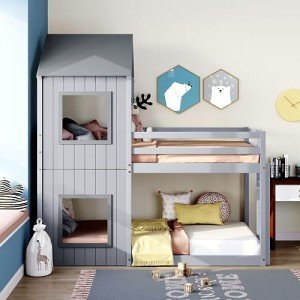Bunk Beds for Kids: A Comprehensive Guide
Bunk beds have been a popular choice for children's bed rooms for years. They offer a space-saving service that optimizes floor location, provides enjoyable climbing up alternatives, and is available in a variety of designs that appeal to kids's imaginations. This short article checks out the benefits, factors to consider, designs, and security features connected with bunk beds for kids.
Benefits of Bunk Beds
Bunk beds present numerous benefits that make them an attractive alternative for families. Here are some key benefits:
Space Saving
- Bunk beds permit 2 or more children to share a room without sacrificing space for play or other activities.
Affordable
- Purchasing a single bunk bed can be more cost-effective than purchasing 2 separate beds.
Fun Factor
- Kids often see bunk beds as a fun location to sleep and play, cultivating a sense of adventure.
Versatility
- Bunk beds are available in various configurations, including L-shaped, loft beds, and even convertible designs that can change as kids grow.
Organization
- Lots of bunk beds feature built-in storage alternatives, such as racks and drawers, helping keep spaces arranged.
Secret Considerations Before Purchasing
Before purchasing a bunk bed, it's important to consider particular elements, such as:
- Space Requirements
Measure the space to guarantee that there suffices vertical space, permitting appropriate headroom on the top bunk. - Age of Your Children
Consider their age and maturity. Lots of producers advise that kids under six ought to not oversleep the leading bunk due to security issues. - Weight Limit
It's important to check the weight limits of the bunk bed for both the leading and bottom bunks to guarantee security. - Style Preferences
Select a design that matches the room's decor and the kids's choices. - Product
Bunk beds are available in numerous products, such as wood or metal. Each has its advantages and downsides regarding resilience and visual appeals.
Styles of Bunk Beds
Bunk beds are available in numerous styles to fit various looks and functional requirements. Here's a list of some popular styles:
- Standard Bunk Beds
Classic stacked beds that include two beds developed one above the other. - Loft Beds
A bed elevated high off the ground, with space beneath for a desk, play area, or storage. - L-Shaped Bunk Beds
Two beds organized in an L-shape, providing more floor space and a special design aspect. - Twin Over Full Bunk Beds
These choices include a twin bed on the top and a full-sized bed on the bottom, accommodating older kids or adults. - Triple Bunk Beds
Designed for 3 kids, these beds normally consist of 3 stacked beds, ideal for bigger households.
Safety Features to Consider
Making sure the safety of children using bunk beds is critical. Here are some safety includes to try to find before buying:
- Guardrails
A bunk bed must include tough guardrails on the leading bunk to prevent accidental falls. - Ladders
Guarantee that the ladder is safely connected and simple for kids to browse securely. - Stability
Try to find bunk beds with lower centers of gravity and wide bases to offer better stability. - Quality Construction
Choose beds made from long lasting materials that meet safety requirements, such as ASTM (American Society for Testing and Materials) policies.
FAQs About Bunk Beds
1. What age is proper for a leading bunk?Generally, kids aged six and older are suggested for oversleeping the top bunk. 2. Are bunk beds safe for toddlers?Most experts advise against
positioning toddlers in the leading bunk due to the
threat of falls and inappropriate ladder use. 3. Bunk Bed UK be separated?Many bunk beds are created to be separated into 2 standalone beds,
providing included flexibility as kids grow
. 4. How do I maintain a bunk bed?Regularly look for loose screws and use, keep mattresses clean, and make sure that the bunk bed is
stable to lengthen its life expectancy. 5.
Exist any unique bed mattress requirements for bunk beds?Yes, mattresses for bunk beds need to fit snugly without leaving gaps. Typically, thinner mattresses
(around 6 to 8 inches )are recommended for leading bunks for security. Bunk beds offer a versatile, useful, and enjoyable solution for children's sleeping arrangements, optimizing space while accommodating several kids in one space. By thinking about the essential factors
of design, security, and space, parents can make a notified decision when choosing the best bunk bed for their children's needs. With the best care and maintenance, a bunk bed can be a precious furniture piece that offers years of use and satisfaction for kids. Summary Table of Bunk Bed Styles Style Description Best For Requirement Bunk Beds Traditional style, 2 stacked beds Smaller sized rooms Loft Beds Elevated bed with open space below Research study or play areas L-Shaped Bunk Beds 2 beds in an L-shape
Added flooring space Twin Over Full Twin on leading,
| full on bottom Accommodating older children Triple | ||||||
|---|---|---|---|---|---|---|
| Bunk Beds | 3 stacked beds | Bigger households By comprehending | the various choices available, designated considerations for security and functionality, and suitable age guidelines, families | can select the ideal bunk bed that not | only boosts their living space | but also ensures a safe and |
| enjoyable sleeping environment | for their children.

|
